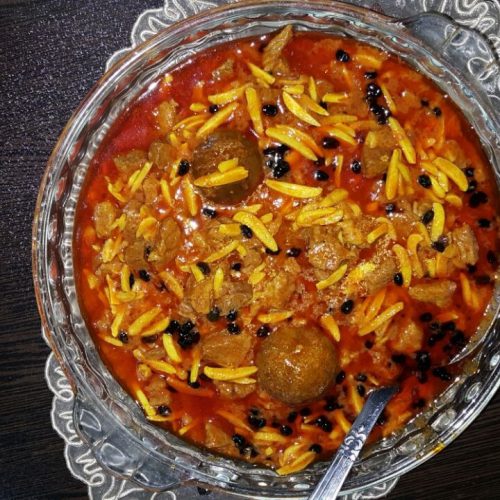Khoresht Khalal | Persian Silvered Almond Stew
You are lucky if you have the chance to try traditional Persian dishes. There are thousands of Persian dishes that they origin goes back to many different parts of Iran. In this article we are going to introduce a very special stew made from silvered almonds named Khoresh Khalal.
This stew is very delicious and the color, as the natives claim, must be bright. This stew is made from cubed lamb meat, silvered almond, rosewater and barberries. As you can guess from the ingredients, the stew is very fragrant and tasty. If I were you, I wouldn’t hesitate a second and would made this stew as soon as I can.
The original recipe contains cubed lamb or beef, but it can be made by poultry such as turkey or chicken. Also as a vegetarian you can make the dish meatlessly and that would be tasteful as well.
Let’s get started and learn more about this fabulous Persian cuisine.

Khoresht Khalal | Persian Silvered Almond Stew Recipe
Ingredients
- 600 g Lamb
- 500 g Silvered almond
- 700 g Onions
- 5 Limoo Amani (Persian dried lime)
- 1 teasp Powdered cardamom
- ½ teasp Powdered ginger
- 1 cup Rosewater for soaking the silvered almonds
- 3 tbsp Rosewater for the stew itself
- Salt as much as required
- Turmeric as much as required
- Pepper as much as required
- 4 tbsp Condensed brewed saffron
- Oil (preferably extra virgin solid oil) as much as required
- 3 tbsp Tomato paste
- 1 Cinnamon stick
- 5 tbsp Black barberries
- Liquid oil as much as required
Instructions
- To make a really traditional Kermanshahi Khoresh Khalal, you need to use a big amount of meat and silver almond. Natives sometimes mention that the amount of meat and silvered almond must be equal. First of all, you need to soak the silvered almonds in a cup of rosewater and 2 tbsp of brewed saffron.
- Chop the washed and cleaned meat into small cubed shapes. The size of them must be half of a knuckle of a finger.
- Wash the onions and peel them neatly. Grate the onions because it helps the better juice of the stew. Then saute the grated onions in a greased pan for a while. When it is close to discarding the grated onions, add some turmeric to them. Do not saute them anymore, because the onions’ taste will turn bitter.
- Add the cubed meat to the onions and saute them for a while. Right the moment the color of the copped meat changes, add the tomato paste and stir fry. The stir frying removes the raw smell of the tomato paste. Add the pepper and powdered ginger to the frying meat and stir properly.
- Add some boiling water to the content (it should cover the surface of the cubed meat and the content should be covered by it all.) and let the meat cook well. When the meat is parcooked, add the soaked silvered almonds to the stew and stir. Meanwhile add the cinnamon stick to the stew and them go for the limoo amanis. Make small holes in dried limes and place them into the stew. Now add some salt to the stew. Leave the pot on the low heat flame and let it cook properly.
- In the remaining 20 minutes of the cooking process of the stew, when only 1 knuckle of the juice is left, add the powdered cardamom, 3tbsp of rosewater and 2 tbsp of condensed brewed saffron to the stew. In this step you should also check the salt of the stew, add some salt if needed.
- Saute the black barberries with the solid oil or butter and add them to the stew in the last 10 minutes of the cooking process of the Khoresh. Your super delicious stew is ready to be served. You can serve this Persian stew with Persian saffron rice or kateh.
Tips to Have a Better Khoresh Khalal
- One of the very important techniques that improves the taste of this traditional stew is boiling the meat for a while and removing the foam floating on the surface. The meat is now ready to be chopped and then fried.
- The black barberries are originally from Kermanshah. It is very important to use enough amount of them, overusing these kind of barberries results in darker stew. You remember we mentioned the better qualified stew is the brighter one.
- If you do not have black barberries, you can use the red one instead.
- Why not using cinnamon powder instead of the stick? Because of the desirable color of the stew. Cinnamon powder only makes it darker.
- Do not overuse tomato paste because it changes the dominant and original flavor of the stew.
- It is a must-do to soak the silvered almonds. Better to be in rosewater and saffron.
- Khoreshte Khalal is not a diluted stew, discard it from the gas burner when the extra juice is vaporized.
Did you like the recipe? Let us know by rating and leaving your comments!


oh gosh! khoresh khalal is perfect
I loved the almond stew
perfect stew! it was so fancy
the silvered almonds add a very greasy form to the dish
this delicious stew is from kermanshah and I am too. I loved it
the stew is very juicy and delicious
wow the dish is so delicious
the meat in it is so delicious
thanks for the very obvious instruction
thanks for the very delicious recipe
With respect, slivered almonds, not silvered.